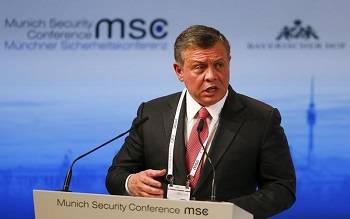Throughout Jordan, street signs have been replaced by beaming campaign posters and car parks filled with rows of seats for rallies.
Campaigning reached its peak on Sunday night before lapsing into an enforced silence in preparation for Tuesday's polls, which will be different from other elections in the kingdom's recent past.
Jordan made significant changes to its electoral law this year, replacing a controversial one-person-one-vote system with a list-based system designed to encourage political parties. As a result, key opposition groups that previously boycotted the election, including the Muslim Brotherhood, are back.
It is a major development at a time when regional wars, an ever-growing refugee crisis and a struggling economy have all converged to threaten Jordan's stability. Government spokesman Mohammad Momani has said the 2016 vote would be "historic by all means".
On the streets, however, the response has been muted. For decades, Jordan's elections have been greeted with apathy, as parliament's failure to challenge government policies has fostered frustration among voters.
Most recently, representatives passed a motion increasing the powers of the king, and in 2013 they failed to select a prime minister despite the king's request that they do so. In past elections, voter turnout has hovered around 55 percent.
"Most people don't care about the elections," Maha Oudat, an independent candidate running in the southern Maan governorate, told Al Jazeera. "I reached out to a lot of people, and most of them don't care. They don't trust in the performance of parliament."
A survey by the International Republican Institute (IRI) think-tank conducted this June found that 87 percent of Jordanians believed the most recent parliament had accomplished nothing worthy of commendation, while only 29 percent considered the legislative branch to be effective. More than half of the respondents said they were unlikely to vote.
"Parliament is a form of theatre, and people know this," political risk analyst Kirk Sowell told Al Jazeera. "It cannot choose the government, cannot originate legislation, and although it can amend it, this power is meaningless since the senate can amend its amendments, and the king can also veto."
Jordan is often described as a tribal society, where ties to large family groups are crucial in defining who holds power. Citizens are among the first to admit that family and personal loyalties are an important driver for political choices; that sense is echoed by polls and pundits, some of whom have urged citizens to pay attention to policies rather than personal loyalties.
Campaigning often involves networking or securing votes through personal assurances, while party programmes or "visions for change" play a less important role.
The one-person-one-vote law, scrapped earlier this year, entrenched that culture by encouraging voting for individuals. It was introduced by King Hussein in response to major Islamist gains after the 1989 election, with subsequent parliaments consisting of individuals rather than parties with a shared programme.
We have to regain the trust of the people through our electoral process. This is our goal and this is what we are going to do.
Supporters say that they hope the new electoral law will help to revive the political system. It requires voters to pick from among pre-set lists of candidates - a system that could encourage stronger organizing between candidates on ideological or party-based grounds.
How this will work in practice, however, remains to be seen. Of 1,293 candidates competing for 130 seats in Jordan's parliament, 82 percent are non-partisan. The Muslim Brotherhood and Islamist parties, while making a strong showing, have been fractured into smaller groups.
But Khaled Kalaldeh, a former political affairs minister who has since become president of Jordan's Independent Electoral Commission, said he was confident in the new system.
"There is not a single party boycotting this election," he told Al Jazeera. "Some didn't present candidates, but all of them they agreed to participate in the election for parliament ... Our mandate is to run this election with integrity, trust and in an impartial way. We have to regain the trust of the people through our electoral process. This is our goal and this is what we are going to do."
In Maan, Oudat said that reaching out to residents and giving people a reason to engage in politics was crucial to encouraging Jordanian democracy. The region she represents is relatively rural and conservative, outside of the wealthy bubble of West Amman. Economic issues are a top priority for voters in her area, she said, with average unemployment across Jordan reaching nearly 15 percent - and double that among young people.
"We have to increase people's trust," Oudat said. "We need to talk to people, to reach people and to talk about programmes. And I think, hopefully, we can change things."
Still, it will be a tough road ahead. Studies by the IRI and the University of Jordan have suggested that the troubled economy is a key cause of voter apathy, while 58 percent of Jordanians were unaware of the new electoral law, the IRI found.
In Amman, many voters told Al Jazeera that they did not trust politicians to make decisions that represented their communities. Tim Naser, a business owner in the city's downtown, said he was optimistic about the potential of parliament to bring positive change - but major hurdles remain.
"I know they made many changes, but to be honest I don't know what the changes are," Naser said. "Two of my family members are running for seats, so I need to support them. This is Jordan - it's just how these things work here."
PHOTO CAPTION
Jordan's King Abdullah speaks at the Munich Security Conference in Munich, Germany, February 12, 2016. REUTERS
Al-Jazeera


 Home
Home Discover Islam
Discover Islam Quran Recitations
Quran Recitations Lectures
Lectures
 Fatwa
Fatwa Articles
Articles Fiqh
Fiqh E-Books
E-Books Boys & Girls
Boys & Girls  Articles
Articles










